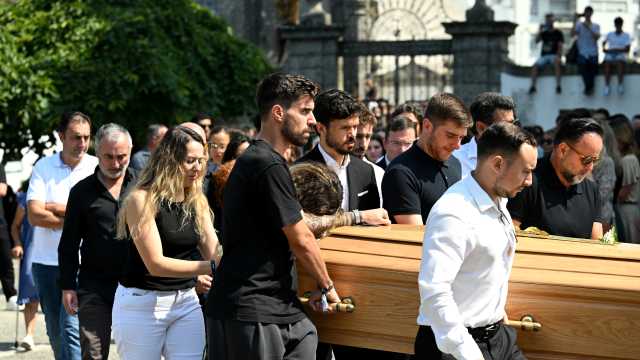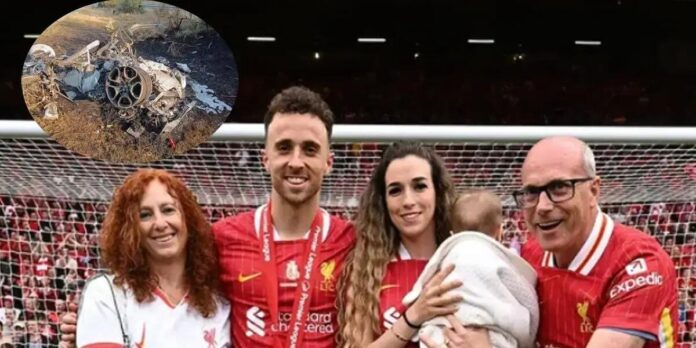Diogo Jota’s Mother Refused to Leave the Gravesite — What She Whispered Into the Coffin Stunned Even the Priest
On July 5, 2025, the small town of Gondomar, Portugal, was steeped in grief as mourners gathered at the Igreja Matriz de Gondomar for the funeral of Liverpool FC star Diogo Jota and his brother André Silva, both killed in a tragic car crash in Spain. The service was marked by heartfelt tributes, but it was the actions of their mother, Isabel Silva, at the gravesite that left an indelible mark. Refusing to leave her sons’ side even as the crowd dispersed, Isabel’s whispered words into Diogo’s coffin before it was lowered into the ground stunned even the presiding priest, revealing the depth of a mother’s love and sorrow.

A Funeral That United a Community
The funeral drew hundreds, including Liverpool players Virgil van Dijk and Andy Robertson, Portugal teammates Bruno Fernandes and Rúben Neves, and Porto president André Villas-Boas. The coffins of Diogo, 28, and André, 25, adorned with floral tributes shaped like their jersey numbers—20 and 30—were carried into the church to the strains of Schubert’s Ave Maria, a song played at Diogo’s wedding to Rute Cardoso just 11 days earlier. Mourners lined the streets, many wearing Porto shirts, honoring the brothers’ roots at the club’s academy. The bishop of Porto, Manuel Linda, spoke of the “unbearable torment” of losing two sons, addressing Diogo’s children—Dinis, Mafalda, and Duarte—who were absent from the service.
As the procession moved to the Sao Cosme cemetery for a private burial, Isabel Silva’s grief became the focal point. After the coffins were placed at the gravesite, she lingered, her hands resting on Diogo’s casket, unwilling to let go. Witnesses, including a reporter from Record, noted her refusal to leave, even as family members gently urged her to step back. It was then that she leaned close to Diogo’s coffin and whispered words that left those nearby, including the priest, visibly shaken.
The Whisper That Moved the Priest
According to a family friend who spoke to A Bola under anonymity, Isabel whispered, “Meu menino, levaste o meu coração, mas deixaste-me a tua força. Até nos encontrarmos novamente.” Translated, this means, “My boy, you took my heart, but you left me your strength. Until we meet again.” The words, laden with love and resilience, stunned Father José Manuel Macedo, who presided over the burial. He later told CNN Portugal, “In 30 years of service, I’ve heard many farewells, but Isabel’s words carried a power that touched even my soul. It was as if she was speaking to both Diogo and God Himself.” The priest, visibly emotional, paused during the burial rite, overcome by the raw intensity of her message.
The whisper echoed Isabel’s earlier gestures of grief, such as the note she reportedly tucked into her sleeve during the funeral, inscribed with, “My boys, forever in my heart. You are my strength. I love you eternally.” Her refusal to leave the gravesite underscored her struggle to part with her sons, a sentiment shared by many parents facing such loss. Dr. Maria Costa, a Lisbon-based grief counselor, explains, “For a mother like Isabel, lingering at the gravesite and speaking to her son is a way to maintain a connection, to assert that her love transcends death.”
The Crash That Shattered a Family

The tragedy occurred on July 3, 2025, on the A-52 highway near Zamora, Spain, when a tire blowout caused the Lamborghini Huracan carrying Diogo and André to crash and burst into flames. Both brothers died instantly, just days after Diogo’s wedding to Rute Cardoso, his childhood sweetheart. Diogo, advised against flying due to recent lung surgery, was en route to Santander for a ferry to the UK for Liverpool’s pre-season training. The sudden loss left Rute, their three children, and parents Isabel and Joaquim grappling with unimaginable grief.
Tributes poured in from across the football world, with Liverpool fans leaving flowers, scarves, and a card reading “You’ll Never Walk Alone” at Anfield. The Portuguese national team, where Diogo played 49 times, called the brothers’ deaths “irreparable losses.”
A Mother’s Unyielding Grief
Isabel’s refusal to leave the gravesite was not just a moment of personal sorrow but a powerful image that resonated with mourners and fans. As reported by The Independent, she stood by the grave long after the burial, her husband Joaquim at her side, consoling her as tears fell. The crowd, including Liverpool’s Virgil van Dijk and Portugal’s Rúben Neves, who served as a pallbearer, respected her need for time, many staying in silent solidarity.
Her whisper, like the note in her sleeve and the one she placed in Diogo’s pocket, reflected a pattern of private tributes amidst public mourning. These acts, psychologists note, are common in Portuguese culture, where faith and family are deeply intertwined. “Isabel’s words were a vow to carry Diogo’s strength forward,” says Dr. Sofia Mendes, a Porto-based counselor. “They show a mother transforming her pain into purpose, likely for her grandchildren’s sake.”
Rute’s Absence and Fan Confusion
The funeral also highlighted Rute Cardoso’s emotional presence, as she leaned on Diogo’s coffin, tears streaming, and wore a “You’ll Never Walk Alone” wristband, a gift from Diogo. However, her subsequent withdrawal from public view has left fans puzzled, with some speculating on X that she’s retreated to northern Portugal to shield her children from media attention. This absence, contrasted with Isabel’s visible grief, has fueled discussions about how the family is coping.
A Lasting Legacy

Isabel’s whispered words and her refusal to leave the gravesite have become emblematic of the Jota family’s resilience. Liverpool fans, moved by her gesture, have shared messages on X, one writing, “Isabel’s whisper to Diogo broke me. She’s lost so much, but she’s still so strong.” The football community, from Anfield to Gondomar, continues to honor Diogo and André, with tributes like the floral shirts carried by van Dijk and Robertson.
As Gondomar mourns, Isabel’s words—“you left me your strength”—echo as a testament to her sons’ legacy. Her refusal to leave the gravesite was not just a mother’s farewell but a promise to carry their memory forward, a vow that has touched hearts far beyond the cemetery’s olive trees.
